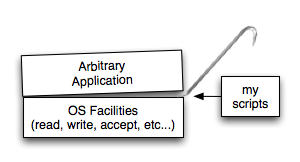La Brea allows you to inject scripts into an existing application without recompiling.
Initially, this was built to slow down specific parts of an application programatically. It's great for simulating a slow network, disk, or other types of things within a process.
The following patterns are available for injection:
Invoked before the function fname is called. The arguments to be
given to fname are provided.
These functions should not return values.
Invoked after the function fname has completed. Both the return
value and the original arguments are provided (in that order). This
is invoked before returning control back to the application, but you
have little opportuntity to do anything particularly destructive here.
These functions should not return values.
Invoked instead of fname. This allows for ridiculous magic. Since
it's a bit complex, I'll cover it in more detail here.
First, the arguments are as follows:
- A reference to the original function.
- Any additional arguments required by that function.
The original function can be invoked using the invoke function in
lua and that function can pass along whatever parameters may be
interesting. For example, if you'd like to truncate all reads so that
the application never reads more than 64 bytes, you can do the
following:
function around_read(f, d, buf, size)
if size > 64 then
size = 64
end
return labrea.invoke(f, d, buf, size)
endAlternatively, you can just cause an error as shown in the random errors example.
First, write a script to slow stuff down. For example, if you'd like to slow random seeks down, you can create a script that looks like the following:
function before_lseek(fd, offset, whence)
if math.random(1, 100) == 13 then
io.write(string.format("Slowing down a seek on fd=%d to %d (%d)\n",
fd, offset, whence))
labrea.usleep(1000000)
end
endSave that in a file, say, /tmp/slowseek.lua and then use the
labrea as follows:
labrea /tmp/slowseek.lua myprogram -and -its -arguments
